Parents and Families
As a family member of a Temple University student, you likely have questions about opportunities for student involvement outside of the classroom. On our campus, fraternities and sororities fall on an extensive list of co-curricular options. A growing number of students who hope to enhance their undergraduate experience find what they’re looking for in a fraternity or sorority.
Fraternity or sorority involvement can benefit a student in a number of ways. Each Greek-lettered organization is guided by a creed, ritual, and history. Our community, however, is united by the common values of Leadership Development, Community Engagement, Academic Achievement, and Friendship for Life. These values represent some of the shared benefits of fraternal involvement.
Conversation Guide for Parents & Families
Click here to download a PDF copy of this guide.
Click here to download a PDF copy of this guide.



